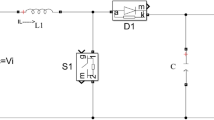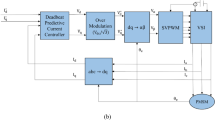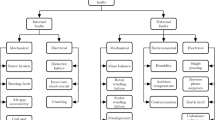Abstract
In this paper, the implementation of a novel speed sensorless vector control of induction motor (IM) drive based on full-order observer is presented. The adaptive full-order observer based on IM equations has been used to estimate stator currents and rotor flux. A novel feedback gains of full-order observer have been proposed to satisfy the stability of the system. The speed is estimated depending on the error between the actual and estimated stator currents. However, the performance of this scheme deteriorates when approaching the zero speed zones because of the effect of the variation of the stator resistance and the problem of the stability. The stator resistance has been estimated in parallel with the rotor speed to compensate the error in estimated rotor speed in the low speed region. Lyapunov’s stability criterion is employed to estimate rotor speed and stator resistance. All gains of all PI controllers have been calculated based on the linearized models of the IM. This paper presents an experimental evaluation of the performance of speed observer when working at very low speed. Synthesis of the controller has been presented. The simulations and experimental results prove excellent steady-state and dynamic performances of the drive system in a wide speed range, especially at very low speeds, which confirms validity of the proposed scheme.












Similar content being viewed by others
References
Blaschke F (1972) The principle of field orientation as applied to the new transvector closed-loop control system for rotating-field machines. Siemens Rev 39(3):217–220
Vas P (1990) The control of AC machines. Oxford Univ, Oxford
Kubota H, Sato I, Tamura Y, Ohta H, Hori Y (2002) Stable operation of adaptive observer based sensorless induction motor drives in regenerating mode at low speeds. IEEE Trans Ind Appl 38(4):1081–1086
Bouhenna A, Chaigne C, Bensiali N, Etien E (2007) Design of speed adaptation law in sensorless control of induction motor in regenerating mode. Simul Model Pract Theor 15:847–863
Suwankawin S, Sangwongwanich S (2006) Design strategy of an adaptive full-order observer for speed-sensorless induction-motor Drives-tracking performance and stabilization. IEEE Trans Ind Electron 53(1):96–119
Diab AAZ, Kotin DA, Pankratov VV (2013) Speed control of sensorless induction motor drive based on model predictive control. In: Micro/Nanotechnologies and Electron Devices (EDM), 2013 14th International Conference of Young Specialists on, IEEE conference, vol., no., pp 269–274
Vdovin VV, Kotin DA, Pankratov VV (2013) State observer for sensorless vector control of doubly fed induction motor. In: Micro/nanotechnologies and electron devices (EDM), 2013 14th International Conference of Young Specialists on, IEEE conference, pp 382–388
Diab Ahmed A Z (2014) Real-time implementation of full-order observer for speed sensorless vector control of induction motor drive. Springer J Control Autom Electr Syst 25(6):639–648. doi:10.1007/s40313-014-0149-z
Texas Instruments C2000 Systems and Applications Team (2012) High voltage motor control and PFC (R1.1) Kit Hardware Reference Guide., v.2
Texas Instruments. CONTROLSUITE. http://www.ti.com/tool/controlsuite
Liu XT (2003) Applied adaptive control. In: Northwestern Polytechnical University Press (in Chinese)
Qu Z, Hinkkanen M, Harnefors L (2014) Gain scheduling of a full-order observer for sensorless induction motor drives. IEEE Trans Ind Appl 50(6):12. doi:10.1109/tia.2014.2323482
Jouaneh M (2012) Fundamentals of mechatronics. SI Edition, CL Engineering, 2012, p 416
Zhang L, Harnefors L, Nee HP (2010) Power synchronization control of grid-connected voltage-source converters. IEEE Trans Power Syst 25(2)
Umland JW, Safiuddin M (1990) Magnitude and symmetric optimum criterion for the design of linear control systems: what is it and how does it compare with the others? IEEE Trans Ind Appl 26(3)
Rezek ÂJJ, Coelho CAD, Vicente JME, Cortez JA, Laurentino PR (2001) The modulus optimum (MO) method applied to voltage regulation systems: modeling, tuning and implementation. In: Proc. International Conference on Power System Transients, IPST’01, 24–28 June 2001, Rio de Janeiro, Brazil
Author information
Authors and Affiliations
Corresponding author
Rights and permissions
About this article
Cite this article
Diab, A.A.Z. Implementation of a novel full-order observer for speed sensorless vector control of induction motor drives. Electr Eng 99, 907–921 (2017). https://doi.org/10.1007/s00202-016-0453-7
Received:
Accepted:
Published:
Issue Date:
DOI: https://doi.org/10.1007/s00202-016-0453-7




